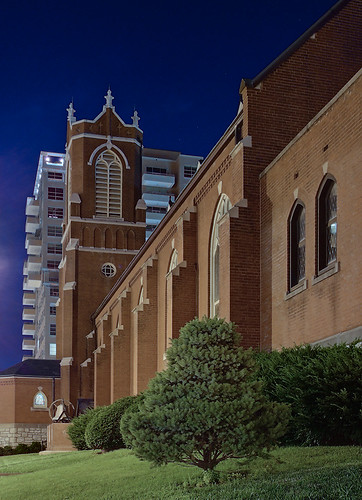
Saint Joseph Church in Clayton is the mother church of many parishes in mid-Saint Louis County.
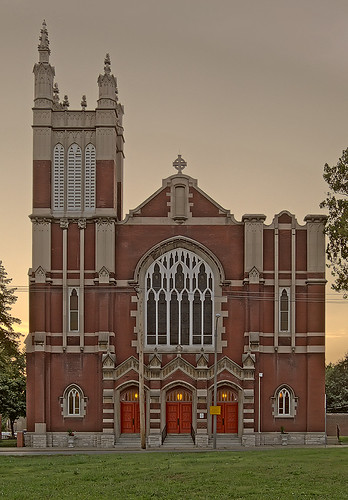
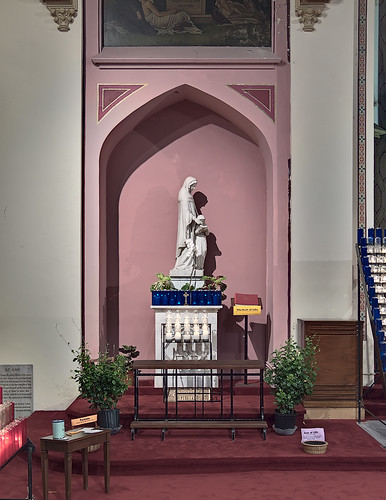
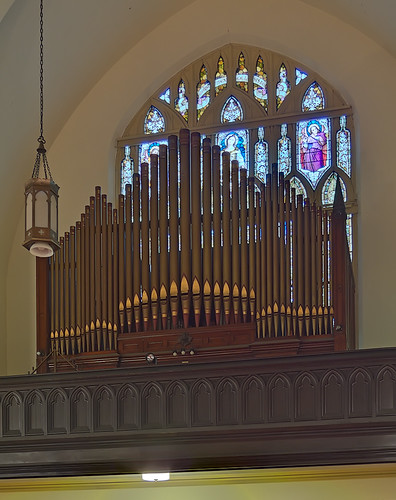
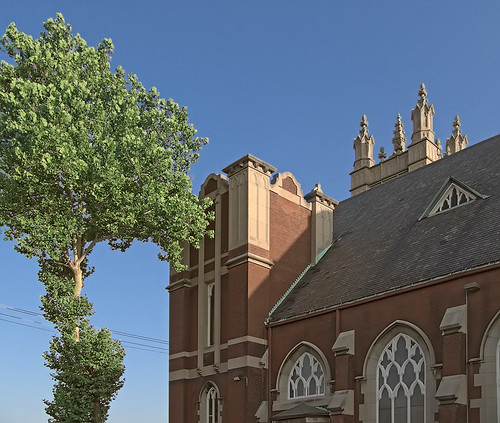
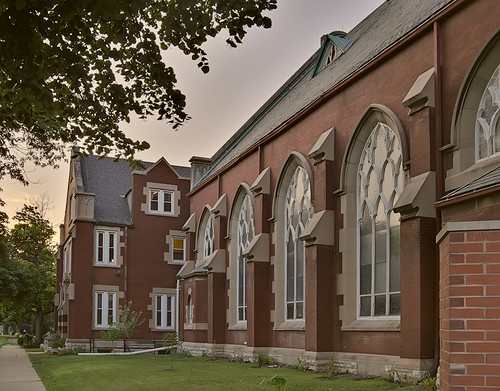
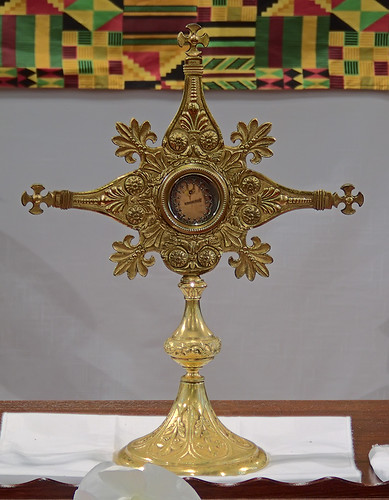
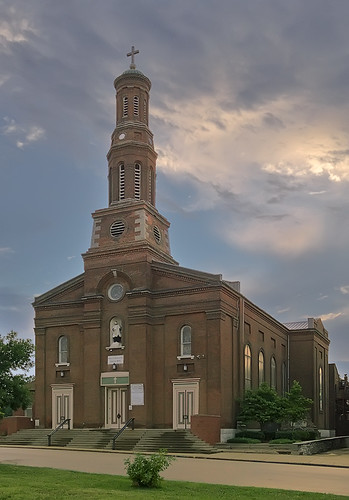

Christ the King Chapel, the Mary Chapel and the Rosary Courts are integrated into the Main Shrine area. A massive steel framework was built. Wet cement was sprayed over the entire structure to form a shell. Rising gracefully from the concrete shell is a 50' concrete "M" which stands for Mary, the Mother of Jesus. A 70' spire rises from the apex of the symbolic "M" serving as a beacon guiding visitors to the magnificent setting. Three circles, representing the Holy Trinity, surmount a bronze cross. A bronze dove in downward flight is at the base of the spire, symbolizing the Holy Spirit.
Our Lady of the Snows
The 16' fiberglass statue of Our Lady of the Snows stands beneath the symbolic dove and before a tongue of fire. She is surrounded by a chalice symbolizing her role as Christ's Mother. Her gown is designed in the form of a Calla Lily, a symbol of purity. She holds the Christ Child up and forward, presenting her Son to the world.
The Altar
The black marble altar in front of Our Lady of the Snows is the Main Altar for outdoor liturgies at the Shrine. Artist Rodney Winfield designed the large bronze crucifix, the tabernacle, and the pair of three branched candelabras. The latticework of metal rings beside the chalice represents graces flowing to us from God. Additional rings and circles are reflected in stonework on the first and second levels of the sanctuary, emphasizing Christs blessings to all who receive Him.
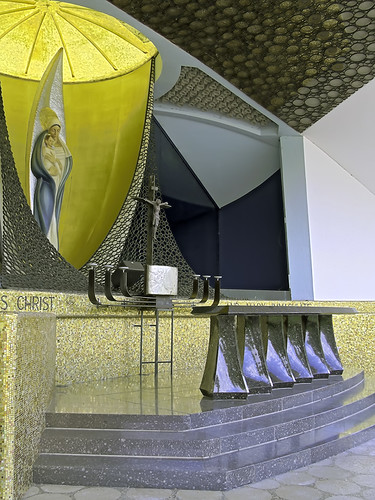
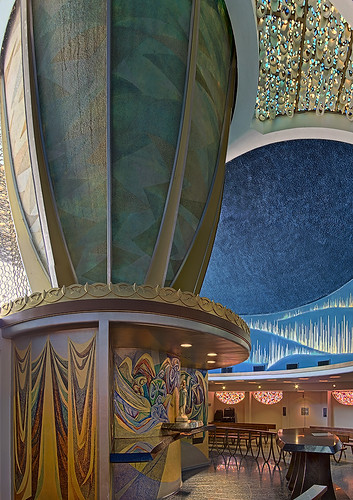
...Celestial scenes of adoring angels are depicted on a circular center wall, created by artist Karl Peterson. A gold and platinum wax base was applied by hand to achieve the breathtaking, three-dimensional effect.
The Aurora Borealis, or Northern Lights, form the panoramic backdrop that shines through the plate glass behind the Outdoor Altar. When lit at night, it envelops the statue of Our Lady with a soft, colorful aura of light. The Aurora Borealis recalls the work of Fr. Paul Schulte, O.M.I., the famous "flying priest of the Arctic," who was known for his work among the Inuit (Eskimo) people. In the Arctic, the Aurora Borealis appears over the frozen horizon as a fiery, vertical rainbow.
The two sets of bronze doors at the entrance of the Mary Chapel represent a significant artistic achievement. Designed by artist Rodney Winfield and cast by an eleven-man crew, the four panels weigh over a half-ton. Fred Lutz of Century Brass remembers the many days of trial and error and an endless stream of calculations. Finally, molten bronze was poured into the huge molds and the doors were cast. After eight months of grinding, finishing, and silvering, the artist burnished the doors and coated them with epoxy to protect them from the elements.The Winfield Gallery website shows some works by Rodney Winfield on classical themes; he also worked for the famed Emil Frei Stained Glass company.
The doors at the right side of the chapel depict the major Old Testament prophets-Moses, Isaiah Jeremiah, and Ezekiel surrounding the tree of Jesse. The New Testament doors, found on the left side of the chapel, depict the Nativity of the Child Jesus. The four Evangelists surround a palm tree that represents Christ's martyrdom. The center section of the doors illustrates the two great Sacraments of the Church (Baptism and the Eucharist).
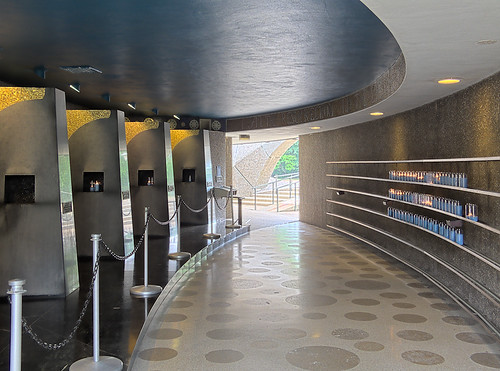
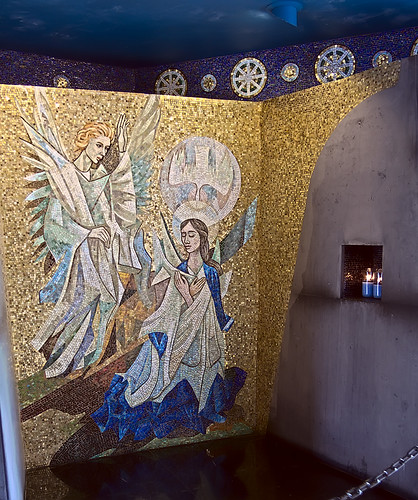
August Queen of Heaven!
Sovereign Mistress of the angels!
Thou who from the beginning
hast received from God
the power and mission to crush the head of Satan,
we humbly beseech thee
to send thy holy Legions,
that, under thy command
and by thy power,
they may pursue the evil spirits,
encounter them on every side,
resist their bold attacks
and drive them hence into the abyss of eternal woe.
Amen
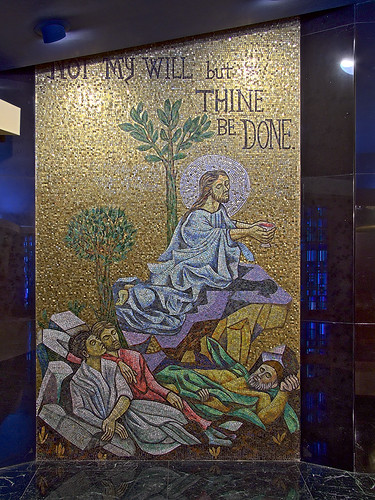

the unfortunate new proposal for Holy Family Cathedral in Saskatoon, Saskatchewan, a $28 million (Canadian) project that resembles nothing so much as a 1960s Pan-Am terminal, despite a sincere and much-appreciated desire among the designers and planners for noble beauty and local materials.Be sure to see Matthew's awesome counter-proposal.
A Prayer to Redeem Lost TimeWasted time! Playing Solitaire only makes you good at playing Solitaire, and as its name suggests, it isn't even good for the pleasant companionship of friends, as are other card games like Poker.
O my God! Source of all mercy! I acknowledge Your sovereign power. While recalling the wasted years that are past, I believe that You, Lord, can in an instant turn this loss to gain. Miserable as I am, yet I firmly believe that You can do all things. Please restore to me the time lost, giving me Your grace, both now and in the future, that I may appear before You in "wedding garments." Amen.